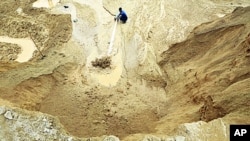U.S. officials say they are "very concerned" about China's decision to sharply reduce exports of rare earth minerals over the next six months, a move that is already driving up share prices for companies producing the crucial metals.
Japanese importers said Wednesday they are also watching the situation closely. The minerals are used in high-tech products ranging from computers to hybrid cars to missile guidance systems.
China, which provides 97 percent of the world's supply of rare earths, announced Tuesday it was cutting its export quota for the first half of 2011 to about 14,500 tons. The cut was initially reported as an 11 percent reduction, but following clarifications from the Chinese government, it is seen as a 35 percent cut from the year-earlier period.
In Washington, the U.S. Trade Representative's office said the United States is "very concerned about China's export restraints on rare earth materials." The spokeswoman said the United States has raised its concerns with China and is discussing the matter with other parties.
The United States said last week that it may complain to the World Trade Organization about China's limits on exports of the rare earths.
Japan's economic minister Akihiro Ohata was less concerned Wednesday, telling his country's Kyodo news service that the cuts were in line with expectations.
But a spokesman for Japan's Sony Corp., a leading manufacturer of electronic products, told Reuters news agency that further restrictions "could lead to a shortage of supply or rise in costs for related parts and materials."
The spokesman said Sony will "watch the situation carefully."
China has been gradually reducing export quotas for the minerals, including a 72 percent cut this year that caused a surge in prices. Officials say they are concerned about protecting the Chinese environment, but also face growing domestic demand for the metals as Chinese companies move into the field of high-tech manufacturing.
China's commerce ministry said late Tuesday that quota for the second half of the year is still under discussion and that it was not appropriate to assume the first-half quotas are representative of the full year.
Some information for this report was provided by AFP, AP and Reuters.




